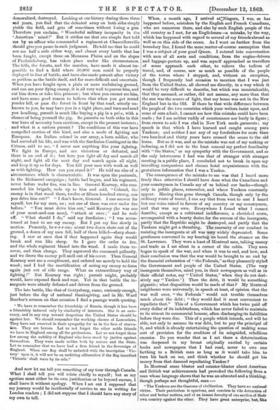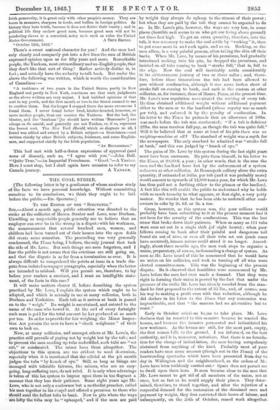And now let me tell you something of my tour
through Canada. What I shall tell you will relate chiefly to myself; but as my egotism must either be its own justification or be beyond excuse, I shall leave it without apology. When I set out I supposed that my journey would be incidentally of service to me in writing for London readers ; I did not suppose that I should have any story of my own to tell.
When, a month ago, I arrived at:Niagara, I was, as has happened before, mistaken by the English and French Canadians,
who are numerous there, and also by such English people of the old country as I met, for an Englishman—a mistake, by the way, which has happened with regard to several of my friends abroad as well as on this side of the ocean. As I went on further from the boundary line, I found the same matter-of-course assumption that I was a subject of your good Queen. I entered into conversation with men of all sorts and conditions, from the engine-drivers and luggage-porters up, and was myself approached as travellers
of sense approach each other, to relieve the tedium of travel, and, of course, saw as much as possible of the people of the towns where I stopped, and, without an exception, though I frequently had occasion to mention that I was just from the United States, all showed me directly, in a way which it would be very difficult to describe, but which was unmistakeable, that. they assumed, or rather, did not assume, any more than that the sun was the source of light, that my home was not in the New England but in the Old. If there be that wide difference between the people of the two countries which your writers insist upon, and some of ours admit, I cannot see how this mistake could have been made ; for I am neither ruddy of countenance nor burly in figure ; from crown to sole I was clad in New York made garments ; my speech is that which I have learned and caught among pure Yankees ; and neither I nor any of my forefathers for more than two hundred and thirty years have crossed the ocean to the old home. But so it was, and as the mistake was not of my making or inducing, as I did not in the least conceal my perfect familiarity with "the States," or my sympathy with the Government, and as the only intercourse I had was that of stranger with stranger meeting in a public place, I concluded not to break in upon my travelling companions and chance hotel acquaintances with the- gratuitous information that I was a Yankee.
The consequence of the mistake to me was that I heard more freely than otherwise I should have done what the Canadians and your countrymen in Canada say of us behind our backs—thougin only in public places, remember, and where Yankees constantly appear. Having thus gone through Canada, though only by the ordinary route of travel, I can say that from west to east I heard but one voice raised in favour of my country or my countrymen, and that was my own. Everywhere I found what I cannot describe, except as a cultivated indifference, a cherished scorn, accompanied with a hearty desire for the success of the insurgents, partly that the Republic might be destroyed, and partly that the Yankees might get a thrashing. The enormity of our conduct in resisting the insurgents at all was very widely deprecated. Some gentlemen conversed in my hearing on board the steamer on the St. Lawrence. They were a knot of Montreal men, talking money and trade as I sat silent in a corner of the cabin. They soon began to spnilr of the war, and when it was to end, and how, and. their conclusion was that the war would be brought to an end by the financial exhaustion of "the Federals," as they pleasantly styled: the Government and people of the United States. (The very insurgents themselves, mind you, in their newspapers as well as in their official notes, say "United States," when they do not deri- sively say "Yankee.") Then the debt, it would be something gigantic ; what disposition would be made of that P My Montreal neighbours were universally, in speech at least, of opinion that the war well over, "the Federals " would not trouble themselves. much about the debt ; "they would find it most convenient to repudiate that." This of a Government which has twice paid off' every dollar of its indebtedness, which has never failed to maintain to its utmost its commercial honour, often discharging its liabffities- before they were due. This of a people which intends, and will be able, not only to assume its war debt, but to pay the principal of it, and which is already entertaining the question of making some- sort of provision for the creditors of its misguided, rebellious. enemies. Do you wonder that as I sat there a determination was deepened in my breast originally excited by certain books and newspapers that I had read, never to owe one farthing to a British man as long as it would take him to turn his back on me, and think whether he should get his money from that damned repudiating Yankee?
In Montreal some bluster and counter-bluster about American and British war achievements had provoked the following from a man whose language shows that he was an educated and a thinking, though perhaps not thoughtful, man :— " The Yankees are the Gaseous of civilization. They have no national virtue. Their patriotism is spurious, and consists in vile detraction of other and better nations, and of an insane ferocity of one section of their own country against the other. They have great enterprise, but, Eke Irish generosity, it is great only with other people's money. They are boors in manners, sharpers in trade, and bullies in foreign politics. eIn history they hate truth, because it does not flatter their vanity ; and in political life they eschew great men, because great men will not be .pandering slaves to a conceited, noisy mob such as rules the United States Government. A TEEM Barrox. "October 12th, 1863."
There's a sweet national character for you And the man had only clearly and compactly put into a few lines the sum of British expressed opinion upon us for fifty years and more. Remarkable people, the Yankees, most extraordinary and un-English people, that they don't like that sort of thing ! Rather actively dislike it, in fact ; and actually have the audacity to talk back. But under the above the following was 'written, which is worth the consideration of Canadians :— "A residence of two years in the United States, partly in New England and partly in New York, convinces me that such judgfaents as the above written are very unjust. I had imbibed opinions of that sort in my youth, and the first month or two in the States seemed to me to confirm them. But the longer I stopped there the more erroneous I found them. I never fouad better bred, kinder-hearted, honester, or more modest people, than our cousins the Yankees. But the bad, the bluster, and the 'bunkum' [he should have written 'Buncombe '] are always on the outside, and generally are not Yankee, or, if so, represent the lowest sort. The New York Herald, which so disgusts us all, I found was edited and owned by a British subject—a Scotchman—and written chiefly by other British subjects, Irishmen, and some English- men, and supported chiefly by the Irish population.
"Ax ENGLISHMAN."
This had met with half-a-dozen expressions of approval (and none of dissent), such as, "I agree with you."—John Bull. "Quite True."—An Impartial Frenchman. " Good.'—A Yankee. Here I must stop, but•I shall again have occasion to refer to my



































 Previous page
Previous page